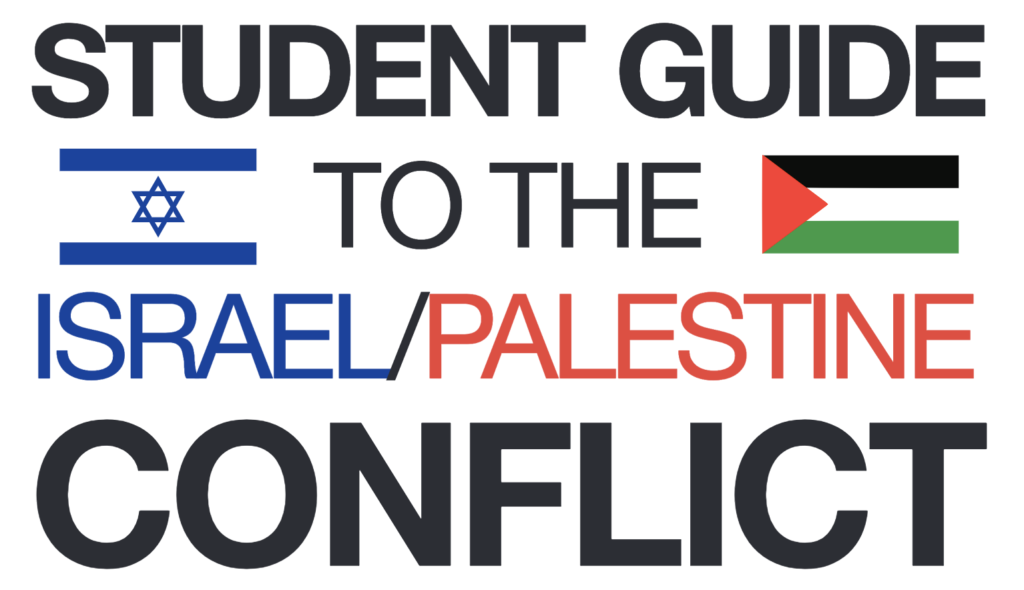EJ JACOBS
Life & Arts Editor
DAN QUAGLIANA
News Editor

On Oct. 7, the militant group Hamas, operating out of the Gaza Strip on the eastern coast of the Mediterranean Sea, launched an attack on the bordering nation of Israel, firing over 3,000 rockets in the initial launches. Since that date, Israel and Hamas have waged a relentless, destructive war against each other, permanently changing the modern geopolitical landscape of the Middle East.
What led Hamas to attack Israel has been building up for many years.
Hamas isn’t an actual country like Israel, but is a terrorist organization that essentially governs the Gaza Strip, which itself is a Palestinian territory on the eastern coast of the Mediterranean Sea.
Israel, on the other hand, is a relatively young nation, having only been around since 1948.
Both Israel and Palestine have been fighting since Israel’s creation — essentially since the end of World War II. This followed directly after Israel gained its independence from Great Britain, which had controlled the territory since World War I. After the war, the newly created United Nations recommended that Israel should be separated into two states — an Arab state and a Jewish state. This would become known as the British Mandate.
This prompted a civil war between what should have been two separate countries. The British withdrew before the process of partitioning the land was completed, and Israel and what would eventually become Palestine couldn’t figure out how to divide the land. This still forms the root of the conflict today.
Hamas, which is short for Harakat al-Muqawama al-Islamiya (Islamic Resistance Movement), was created in 1987 during the first Palestinian uprising as the Gaza branch of the Muslim Brotherhood, which itself was based out of Egypt. They have since morphed into a terrorist organization with the sole goal of obtaining the land that Israel “occupies,” according to them.
After launching their initial attack last month, Hamas issued a statement calling on, “Muslims everywhere to launch an attack.”
In response, Israel immediately declared war on Hamas and has been carrying out a continuous bombardment of the Gaza Strip in order to drive out Hamas’s militants. As a result, many civilians in the Strip have been killed and left without food, water or humanitarian aid.
Israeli Prime Minister Benjamin Netanyahu has repeatedly rejected calls for a cease-fire, saying that they are “calls for Israel to surrender to Hamas.”
Instead, Netanyahu has said that Israel’s goal is defeating Hamas, and he wants all “civilized nations” to support Israel in its war efforts.
Over the course of the currently ongoing war in the Gaza Strip and Israel, the United Nations and many countries have called for a cease-fire, with both sides of the conflict being accused of having committed war crimes in order to achieve victory.
Philippe Lazzarini, the head of the United Nations agency for Palestinian refugees, has claimed that Israel is carrying out a “collective punishment” of Palestinians.
“We are on our knees asking for that sustained, scaled up, protected humanitarian operation,” said Dr. Rick Brennan, the World Health Organization’s regional emergencies director for the eastern Mediterranean region. “We appeal to all of those in a situation to make a decision or to influence decision-makers to give us the humanitarian space to address this human catastrophe.”
Students at SUNY Fredonia have felt directly affected by the situation due to the rise of anti-semitism and anti-Palestinian sentiments. “I’ve noticed that a lot of students have felt unsafe in their environment,” said EJ Jacobs, the president of Hillel, Fredonia’s Jewish student union.
“[However,] the university has done a good job of unbiasedly being there for students,” she noted. On Oct. 16, the university organized a moment of silence open to the whole campus to pay their respects.
The following Wednesday, there was a healing circle event held by the Multicultural Center. This gave students the opportunity to come together in a more relaxed environment.
“For me, it was one of the most powerful moments I’ve ever had in my life,” said Alon Haimovitz, a senior criminal justice major and member of the Jewish community on campus. “And at the same time [at] Fredonia, seeing that a lot of people are against me and against what I represent makes me feel like maybe Fredonia is not what I thought,” he added, referencing the increased antisemitism on campus and across the world.
It is important that SUNY Fredonia does not let hateful sentiments regarding ethnic and religious groups propagate on campus. In solidarity with all those affected, we have put links for people to educate themselves and help those in need.
EJ Jacobs, who was interviewed for this article, is a co-writer of the article.
